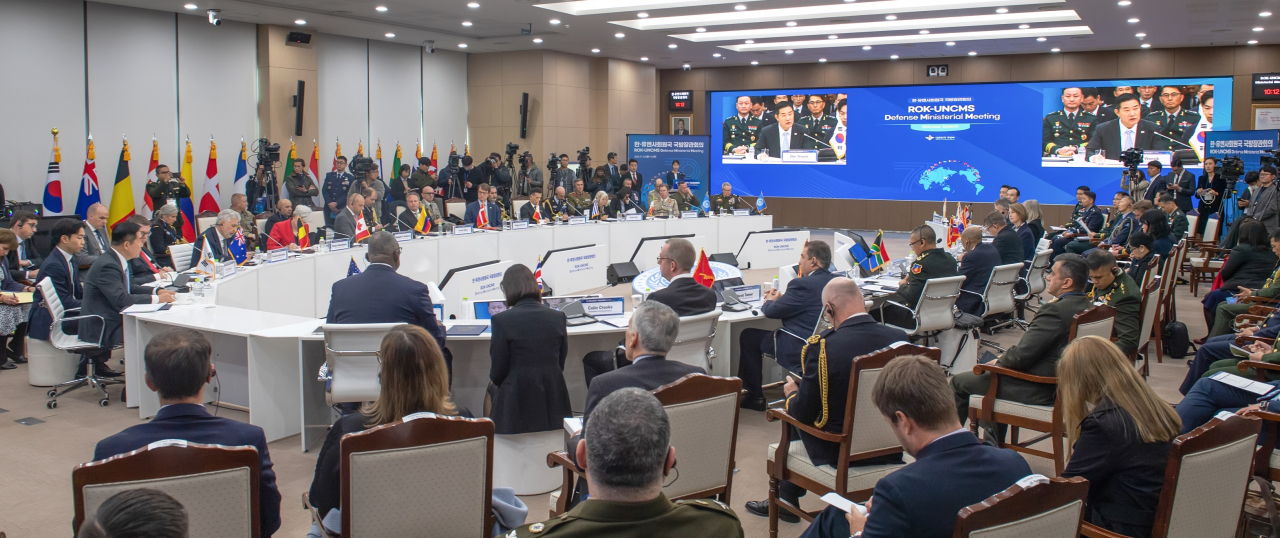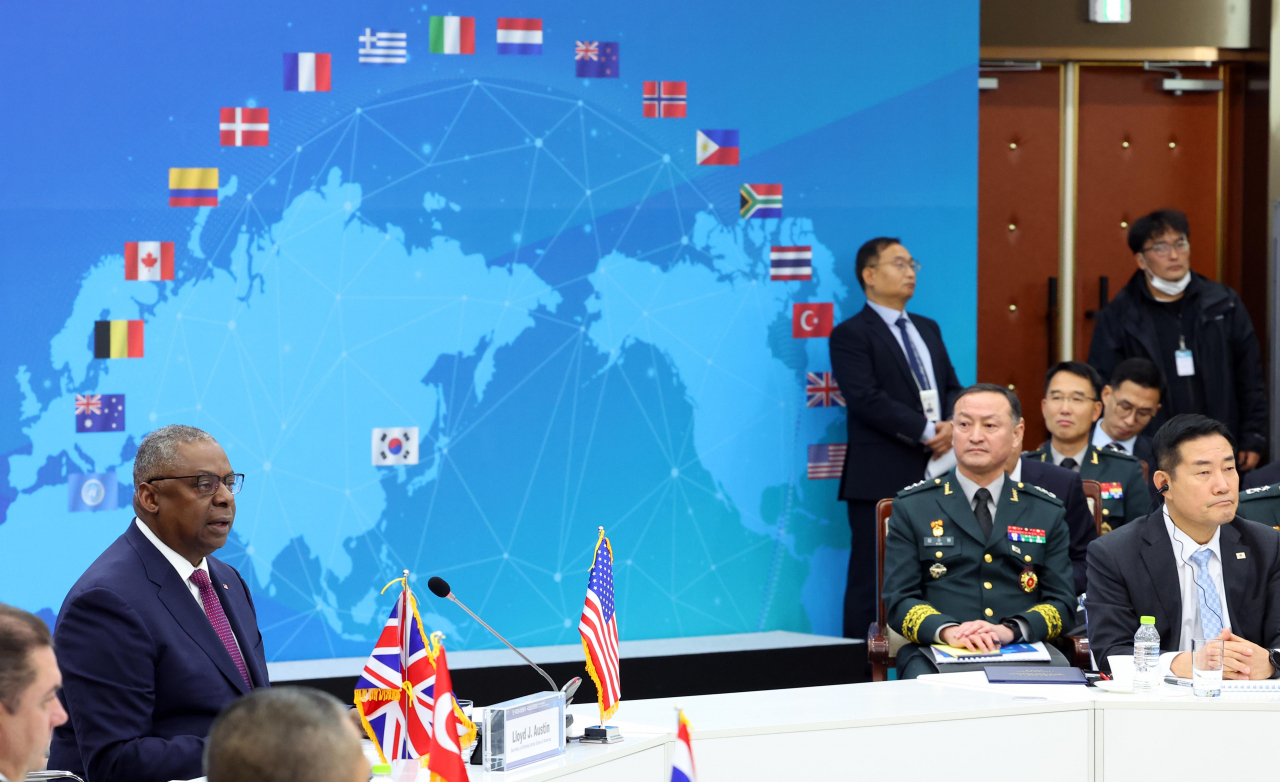 |
South Korea's Defense Ministry hosts the inaugural defense ministerial meeting between South Korea and 17 United Nations Command member states in Seoul on Tuesday. (Defense Ministry) |
The 17 member states of the United Nations Command on Tuesday reaffirmed their commitment to collective action in the event of any hostile actions or armed attacks by North Korea on the Korean Peninsula.
The UNC member states, who once united under the one UN flag to furnish forces and assistance for South Korea during the 1950-53 Korean War, gathered again in Seoul for the recommitment.
The assembly on Tuesday marked the first-ever defense ministerial meeting between South Korea and the UNC member states, hosted by South Korea's Defense Ministry, coinciding with the 70th anniversary of the signing of the armistice agreement.
"The UNC Member States declared that they will be united upon any renewal of hostilities or armed attack on the Korean Peninsula challenging the principles of the United Nations and the security of the Republic of Korea," read a joint statement adopted at the meeting. Republic of Korea is the official name of South Korea.
The UNC member states' reaffirmation was the first since the original commitment on July 27, 1953, when Korean War hostilities ended with a cease-fire.
Seven decades ago, the 16 countries that fought alongside South Korea signed a separate Joint Policy Declaration in Washington. The Declaration says, "If there is a renewal of the armed attack, we should again be united and prompted to resist."
Of the 16 countries that sent troops and six others that provided vital medical assistance, 17 have remained as UN Command member states.
During this meeting, the UN Command and South Korea's Defense Ministry also respectively outlined the UNC's role in deterring war and preserving peace on the Korean Peninsula as well as strategies to enhance cooperation and solidarity between South Korea and UNC member countries.
As the outcome, the UNC member states alongside South Korea, pledged to strengthen cooperation to support the UNC's vital functions.
The UNC was established in July 1950, just one month after North Korea's invasion of South Korea under UN Security Council Resolutions. It was the first attempt at collective security within the UN system.
The primary missions of the UNC include enforcing and upholding the armistice agreement to maintain stability and peace on the peninsula, as well as providing forces and essential supplies in the event of contingencies.
"In managing persistent security challenges, the defense ministers and representatives are determined to continue increasing mutual exchange and cooperation between the ROK-US Alliance and UNC Member States to inform our combined training and exercises," the statement said, recognizing "ongoing security challenges."
The statement also "strongly condemned the DPRK’s unlawful nuclear and ballistic missile programs which violate multiple United Nations Security Council resolutions," referring to North Korea by the acronym of its official name, the Democratic People's Republic of Korea.
 |
US Secretary of Defense Lloyd Austin (left) speaks during the inaugural defense ministerial meeting of South Korea and the United Nations Command member states at the defense ministry in Seoul on Tuesday. (Yonhap - Pool Photo) |
In his welcoming speech, South Korea's Defense Minister Shin Won-sik asserted that the UNC serves as a "symbol of strong deterrence against North Korea's provocations."
"The meeting serves as a venue to showcase the unified strength of the international community against North Korea's threats and to strengthen solidarity among member countries," Shin told participants. "It will also serve as an opportunity to reaffirm the strong commitment of the international community to peace on the Korean Peninsula."
Shin issued a "grave warning" to North Korea, underscoring the fact that North Korea is now a UN member state -- a notable contrast to the situation during the 1950-53 Korean War.
"In the event of North Korea launching another illegal invasion of South Korea, it would create a paradox, with a UN member state attacking another UN member state," Shin said.
"Such an act constitutes a grave act of betrayal against both the UN and the broader international community. The ensuing powerful punishment from the international community, spearheaded by the UN Command, is inevitable to follow."
Shin also conveyed a cautionary message to China and Russia, both wielding veto power as permanent members of the UN Security Council, without explicitly naming the two nations.
"If the countries, which assisted North Korea during the Korean War, decide to support such actions again, they too will encounter grave retribution from the international community."
US Defense Secretary Lloyd Austin also noted the importance of the UNC, especially the major changes in the regional security environment that have unfolded over seven decades.
"Our work together on the Korean Peninsula sends a powerful message that we stand united in defense of peace and security," Austin said. "It helps maintain deterrence by ensuring that we could sustain our forces in theater in the event of crisis or conflict."
In a closed-door discussion, the Defense Ministry put forth three significant proposals to bolster the role of the UNC and South Korea's contributions to the operation, a South Korean senior official said Tuesday on the condition of anonymity.
The first was to consider expanding the UNC's membership. However, countries seeking inclusion must meet specific conditions, including endorsing the Armistice Agreement, adhering to UN Security Council resolutions that form the foundation for the establishment of the UNC and aligning with the 1953 Joint Policy Declaration in Washington.
South Korea also officially expressed its intention to dispatch senior officials, potentially including a general-level officer, to the UNC.
The final proposal involved organizing and staging various training exercises between South Korea and UNC member states to enhance operational capabilities during wartime and improve interoperability.







![[Herald Interview] How Gopizza got big in India](http://res.heraldm.com/phpwas/restmb_idxmake.php?idx=644&simg=/content/image/2024/11/20/20241120050057_0.jpg)